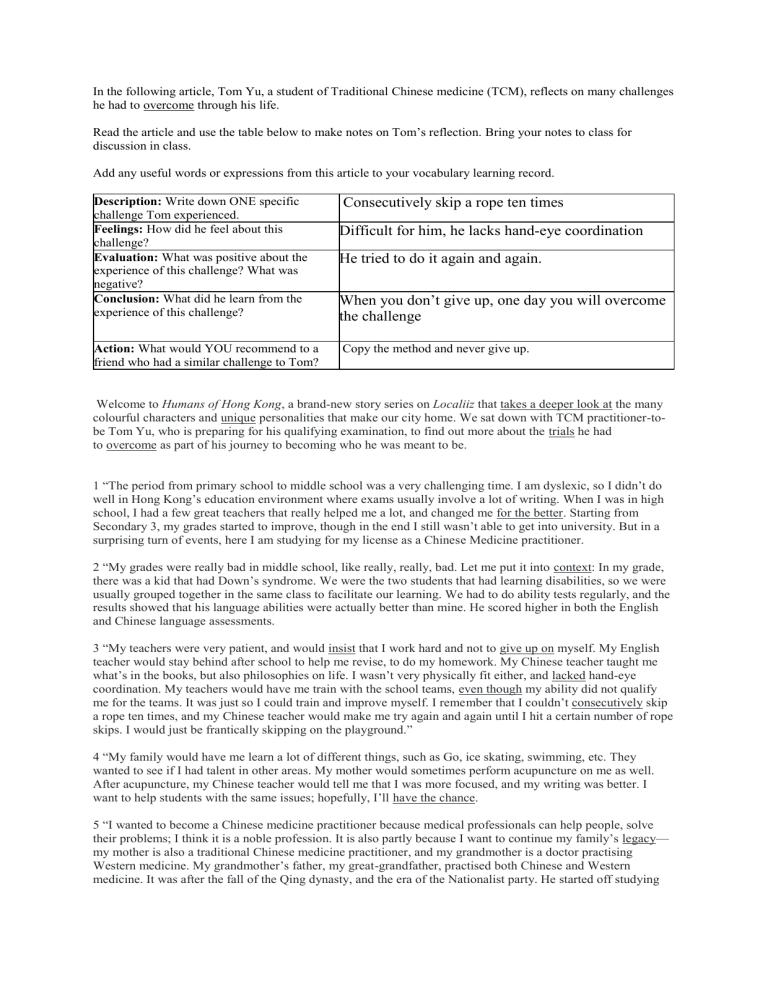
In the following article, Tom Yu, a student of Traditional Chinese medicine (TCM), reflects on many challenges he had to overcome through his life. Read the article and use the table below to make notes on Tom’s reflection. Bring your notes to class for discussion in class. Add any useful words or expressions from this article to your vocabulary learning record. Description: Write down ONE specific challenge Tom experienced. Feelings: How did he feel about this challenge? Evaluation: What was positive about the experience of this challenge? What was negative? Conclusion: What did he learn from the experience of this challenge? Action: What would YOU recommend to a friend who had a similar challenge to Tom? Consecutively skip a rope ten times Difficult for him, he lacks hand-eye coordination He tried to do it again and again. When you don’t give up, one day you will overcome the challenge Copy the method and never give up. Welcome to Humans of Hong Kong, a brand-new story series on Localiiz that takes a deeper look at the many colourful characters and unique personalities that make our city home. We sat down with TCM practitioner-tobe Tom Yu, who is preparing for his qualifying examination, to find out more about the trials he had to overcome as part of his journey to becoming who he was meant to be. 1 “The period from primary school to middle school was a very challenging time. I am dyslexic, so I didn’t do well in Hong Kong’s education environment where exams usually involve a lot of writing. When I was in high school, I had a few great teachers that really helped me a lot, and changed me for the better. Starting from Secondary 3, my grades started to improve, though in the end I still wasn’t able to get into university. But in a surprising turn of events, here I am studying for my license as a Chinese Medicine practitioner. 2 “My grades were really bad in middle school, like really, really, bad. Let me put it into context: In my grade, there was a kid that had Down’s syndrome. We were the two students that had learning disabilities, so we were usually grouped together in the same class to facilitate our learning. We had to do ability tests regularly, and the results showed that his language abilities were actually better than mine. He scored higher in both the English and Chinese language assessments. 3 “My teachers were very patient, and would insist that I work hard and not to give up on myself. My English teacher would stay behind after school to help me revise, to do my homework. My Chinese teacher taught me what’s in the books, but also philosophies on life. I wasn’t very physically fit either, and lacked hand-eye coordination. My teachers would have me train with the school teams, even though my ability did not qualify me for the teams. It was just so I could train and improve myself. I remember that I couldn’t consecutively skip a rope ten times, and my Chinese teacher would make me try again and again until I hit a certain number of rope skips. I would just be frantically skipping on the playground.” 4 “My family would have me learn a lot of different things, such as Go, ice skating, swimming, etc. They wanted to see if I had talent in other areas. My mother would sometimes perform acupuncture on me as well. After acupuncture, my Chinese teacher would tell me that I was more focused, and my writing was better. I want to help students with the same issues; hopefully, I’ll have the chance. 5 “I wanted to become a Chinese medicine practitioner because medical professionals can help people, solve their problems; I think it is a noble profession. It is also partly because I want to continue my family’s legacy— my mother is also a traditional Chinese medicine practitioner, and my grandmother is a doctor practising Western medicine. My grandmother’s father, my great-grandfather, practised both Chinese and Western medicine. It was after the fall of the Qing dynasty, and the era of the Nationalist party. He started off studying Chinese medicine, and was taught the Western-style treatments by preachers from the West that came to China to spread the word of God.” 6 “If we look at the Chinese medicine manuals and history books, you can see that China has been through epidemics and pandemics, big and small, but has been able to survive relatively unscathed, in terms of the population. This shows that traditional Chinese medicine has value. But in Hong Kong especially, Western medicine dominates. In mainland China, a lot of hospitals use both Western and Chinese doctors. Here, you can only use Western medicine in hospitals; they do not recognise the efficacy of Chinese medicine. They think that Chinese medicine would disrupt Western treatments. I think it is time to make some changes to Hong Kong’s medical system, but it’s going to be difficult. In the end, it is hard to produce very concrete evidence to prove the effectiveness of Chinese medicine.” 7 “The best advice I can give to people sharing my predicament is don’t give up. Everybody is here for a reason, and you will find your place in this world. Everybody’s good at something, it just depends on if you’ve found it yet. My school took in more students with learning disabilities after me, and we would take exams together because we would be given extra time. After I got to know them, I found that each one of them had their own talents. Some people were really bad at languages but really good with numbers. Some struggled with all traditional subjects but had an amazing musical ability. It was like every student with a learning disability was lacking in a certain way, but compensated for in another way.” Adapted from https://www.localiiz.com/post/humans-of-hong-kong-tom-yu-student-traditional-chinesemedicine-practitioner



